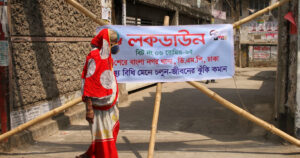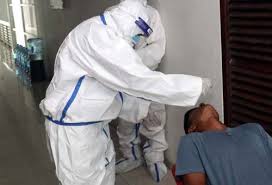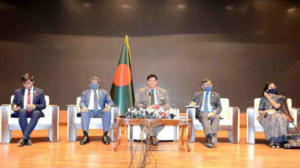Fazle Hasan Abed sold his flat in 1971 and used the money to set up BRAC, which is now considered to be the world’s largest NGO. El País -Planeta Futuro reports.Sir Fazle Hasan Abel spoke with El País’ Alejandra Agudo.”I got £40,000 and invested it. This won me the confidence of donors,because they saw that I was willing to invest my own money,” explained Hasan Abed.
Born in Bangladesh in 1936, the president of BRAC is now nearly 80 and recounts the history of his organisation, which he founded 44 years ago.In 1969, Hasan Abed left London and returned to his native Bangladesh due to a job offer with the Shell Oil Company. However, only two years later he would give it all up. An enormous cyclone had hit Bangladesh in 1970 and the independence war against Pakistan in 1971 had both devastated the country, leaving millions displaced, in poverty or dead. Hasan Abed wanted to help and thought he could do so because of his resources.>>Read: UNICEF report: €2.6 billion needed in 2016 As a result, he set up BRAC in 1972 and it has grown in Bangladesh and 11 other countries ever since, becoming the largest non-profit organisation in the world, employing 120,000 people. His work has helped an estimated 150 million people around the world, earning him several prestigious awards. In 2014, Fortune magazine included him in its list of the best 50 leaders around the world. Just one year later, he also received the World Food Prize for his “unrivalled” work. Despite this recognition, Hasan Abel remains humble and continues to do his work. He has been invited to speak at the World Government Summit, which is currently being held in Dubai.Why is BRAC so successful?
We have a successful model, which responds to the needs of the poor.We have been able to mobilise increasing amounts of resources and grow in order to have an impact on the lives of the needy. That I why I started this.BRAC is more than just an NGO, though. There are universities, banks…Yes. And because of them we do not rely on donors. We have companies that create jobs, banks that help the poor access loans… They are businesses that have a development agenda: they provide jobs,opportunities, to women, to children, to the poor.What is the main challenge that Bangladesh faces today?Providing quality education that can be accessed by the poorest
children. It is, as I said, a question of providing opportunities and to this end we have programmes that reach different levels: education,providing financial services, business advice, access to legal representation for those that cannot afford it…
>>Read: UNICEF: Increasing number of genital mutilation victims But education is the important one. Through schooling, children get
married and have children of their own later in life, and when they do, those children are better fed. All this happens because of
education.Do you feel that you are doing work that governments should be doing?The government should be providing education to all children, but we know that the state is poor and as a result they are only able to educate 85%. We manage to add 7% to this figure. We work in a complementary manner.Given the scale of your organisation and its business network, can it still be considered as a non-profit group?Yes, it’s an NGO! We are not motivated by profit, none of the money made through the organisation goes into the pockets of anyone.Everything goes to BRAC and its used in education and health programmes…I am not a rich man, the money is not mine, it is BRAC’s.Even if we do business, it is not for profit.You say that you are not rich, how’s your life?I take a salary from BRAC, but I don’t own anything. I don’t live in a house, I live in a rented flat. When I set up BRAC, I decided not to own anything, because if you’re in the business of owning things,you’re not in the business of helping the poor.Bangladesh is one the poorest countries in the world, do you think it will be possible to reduce external and internal inequality, despite the trends saying the opposite?If we jump back to the end of the Second World War in 1945 and compare it to 2008, poverty has been eradicated in many countries and people live well in them. For example, Spain was a poor country back in 1945.I was there in 1944, in the south, and it seemed like a poor society.But now things have changed. The majority of people have benefitted from the country’s development.
>>Read: African Union’s Somalia mission hit by EU funding cut It is only after the collapse of the banking system in 2008 that
people noticed that less people were getting rich and more were becoming poorer. Look at Germany and Norway though, they were poor,
now they aren’t.Do you think that the Sustainable Development Goals will help Bangladesh go through a similar process of improvement?
Yes, I do believe that. Bangladesh did very well as a result of the Millennium Development Goals and I believe that we are working very
hard to fulfil the SDGs. I hope. We are one of the government’s main allies in achieving them. We are already working together in many
areas to improve the lives of the poorest people.>>Read: The Internet of Things can help achieve the SDGs Additionally, we have a programme that is going to reach 10% of the country’s population, which will provide microcredit to those that are extremely poor. We have ensured that 1.5 million households have access to aid, scholarships, education and saving schemes. It is a model that we want to export, in order to help lift people out of extreme poverty.Which countries?India, Pakistan, Ethiopia, Ghana, Honduras and Peru. In each, the pilot programmes that have been developed according to the BRAC model have been successful. The results have been published in Science, an American journal, where it has been shown that our programmes have improved quality of life in all areas.What about climate change?We have to adapt to the problems that it will generate. For example,refugees from the south. It’s not just Bangladesh either, it’s happening in India and Myanmar too. And, we have to diversify our agriculture. We are developing plants that live longer. With rises in sea level and loss of land, as well as other factors such as floods and droughts, we have to pursue more resistant crops. We have to work together against this threat.How do you imagine Bangladesh in 2030? I think that poverty will have dramatically reduced and that we won’t be a rich country, but one with an average income per capita. – EIN News




